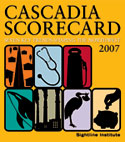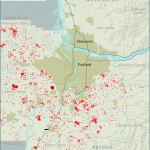Search Results
-
Cascadia Scorecard: Mapping Measure 37
In our newest edition of the Cascadia Scorecard (released yesterday), we examine one of the most important trends in the region: sprawl. It’s an area where there’s been a surprising reversal of fortune. Oregon, long a regional and national leader in smart growth, is losing its lead. According to a new Sightline analysis, in the Portland metro region alone more than 2,000 residential applications for Measure 37 waivers were approved. Together,...Read more » -
Cascadia Scorecard 2007
The 2007 Cascadia Scorecard–Sightline’s regional gauge of progress for the Pacific Northwest–identifies some real victories in the Northwest, but reveals that we still struggle when it comes to energy efficiency, economic security, and curbing sprawl. Despite our reputation for a good quality of life, the Northwest comes up short when we measure what really matters.Read more » -
Cascadia Scorecard 2007: Just Released!
The 2007 edition of the Cascadia Scorecard, the Pacific Northwest’s annual progress report, reveals that the region lags behind world leaders on trends such as energy, sprawl, and economic security. The good news is that we are making progress—and adopting smart solutions will accelerate those gains. Seattle Times has called the Cascadia Scorecard “a pioneering attempt to assess life in the Pacific Northwest across a broad array of measures.” Launched...Read more » -
New Residents From Measure 37 Claims, 2004-2006
Date Range: 2004-2006 Measure 37 has set the stage for poorly planned sprawl in the farms and rural areas surrounding Portland.Read more » -
Visualizing Density
Just wanted to point out a great website, “Visualizing Density,” a product of the Lincoln Institute of Land Policy (LILP). I’m not feeling like my usual prolix self today, so I’ll let them do the talking: Sprawl is bad. Density is good. Americans need to stop spreading out and live closer together. Well… that’s the theory, anyway. But, as anyone who has tried to build compact development recently will tell...Read more » -
Is the SkyTrain the Limit?
As I mentioned last week, greater Vancouver leads the Northwest in transit ridership, with somewhere between two and three times as many annual bus and train rides per person as Portland and Seattle. So the obvious question: how come? Why does Vancouver do so much better in transit statistics than its southern neighbors? If you’re from Seattle, the “obvious” answer might seem to be Vancouver’s SkyTrain light rail system, which...Read more » -
Transit Update: Vancouver Still Riding High
Just ’cause I’m that kind of guy (i.e., geeky), I spent a bit of time a few days ago looking at transit ridership figures in the three major metro areas in the Northwest. And—to nobody’s great surprise—Vancouver, BC remains the region’s transit leader: Metro area Annual transit boardings per capita, 2006 (est.) Greater Vancouver 126 Metro Portland, OR 62 Portland including Clark County, WA 52 Seattle–Everett–Tacoma 42 As you can...Read more » -
No-Walking Blues
I’ve read all sorts of reports and articles about the relationship between mental health and neighborhood design. Most of them focus on the idea that living in a sprawling, low-density area—the sort of place where you can’t walk anywhere, and you only see your neighbors as they drive into their garage—can be isolating, anonymous and…well…depressing. But for the most part, I’ve thought of this research more as suggestive than conclusive....Read more » -
My Commute is Killing Me
This isn’t the freshest bit of news, but it’s still interesting: The Washington Postreports that killer commutes aren’t a misnomer. [A] long commute can be harmful to your health. Researchers have found that hours spent behind the wheel raise blood pressure and cause workers to get sick and stay home more often. Commuters have lower thresholds for frustration at work, suffer more headaches and chest pains, and more often display...Read more » -
The Fight of the Condo
Let’s leave the vitriol aside for the moment. In his most recent Mossback column, condo-critic Knute Berger makes the following claim about Seattle’s gradual move towards denser housing: “We know that these green-backed policies [i.e., the ones promoting dense development in Seattle] are making the city more unaffordable.” No, in fact, we do not know that. Of course, it’s a common complaint. Apparently, lots of people view condo development as...Read more »



